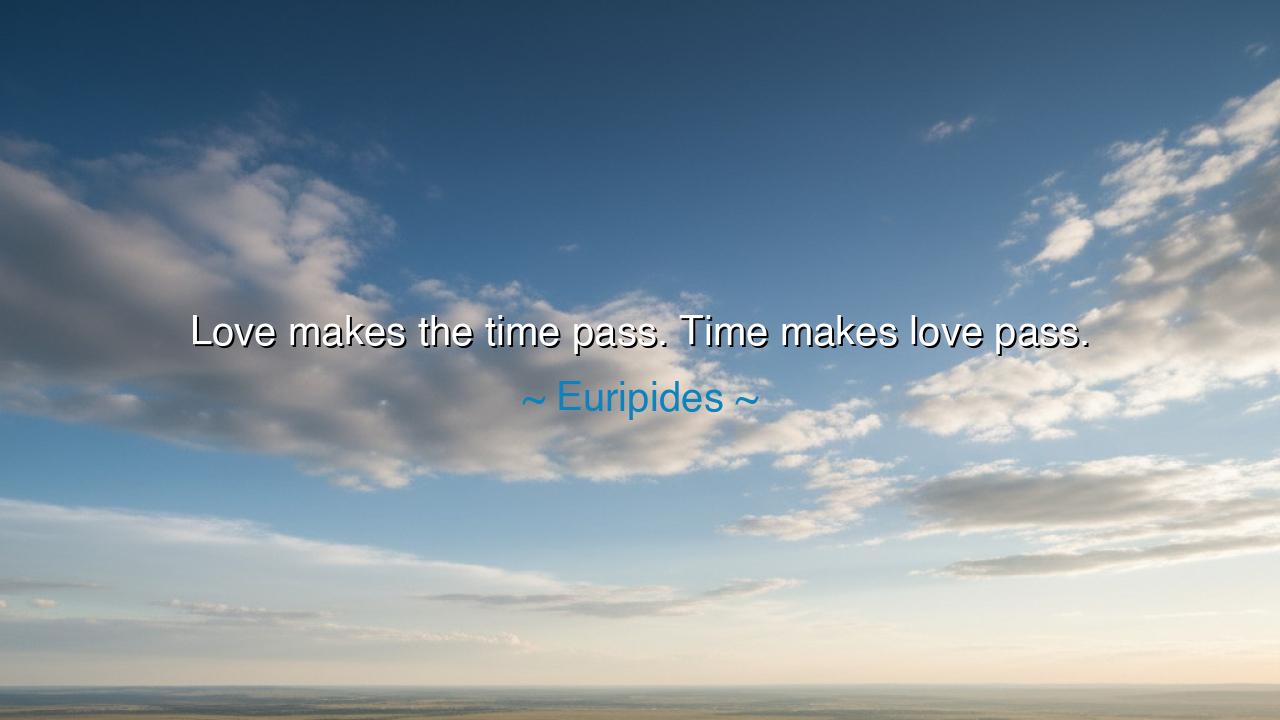
Love makes the time pass. Time makes love pass.






"Love makes the time pass. Time makes love pass." Thus wrote Euripides, the ancient Greek tragedian whose understanding of the human heart was as deep as the Aegean and as fierce as the gods themselves. In this brief and haunting paradox, he captures the full circle of love’s power and fragility—its ability to make the hours vanish in bliss, and its tragic tendency to fade beneath the slow erosion of time. For Euripides, love is both the flame that lights the soul and the fire that consumes it. It makes life radiant, yet it is fleeting as the sunset. His words, born from the ancient stage, still speak to every generation that has ever known passion’s joy and the ache of its passing.
When love first stirs, time itself bends beneath its spell. The lover forgets the world; minutes dissolve into moments of wonder. Each heartbeat seems eternal, each glance a universe. Love, in its first glory, makes time pass without notice, for the soul has found its mirror. To love is to live in a suspended world, where the stars shine closer and the burdens of existence melt away. This is what Euripides meant: that love transforms time, making the fleeting feel infinite, and the ordinary divine. Yet he also knew that the same time which once seemed conquered will, in the end, conquer love itself.
For time, patient and silent, is the most relentless of all forces. It does not rage, yet it destroys. The same days that once vanished in laughter return to stretch endlessly when love cools. What was once ecstasy becomes memory; what was once presence becomes absence. Time does not kill love—it simply reveals what is not strong enough to endure. Euripides, who had seen the passions of men and gods unravel in his tragedies, knew that no mortal feeling escapes the touch of time. Thus his wisdom is not bitterness, but understanding: that love, if not tended like a flame, will be consumed by the very hours it once illuminated.
Consider the tale of Paris and Helen, whose love ignited a war and defied the kingdoms of the earth. Their passion made time vanish as they fled across the seas, forgetting duty, oaths, and the world’s judgment. Yet as the years of battle wore on, their fire waned beneath the weight of guilt, loss, and destiny. The same love that once seemed immortal could not withstand the passage of time. Euripides himself wrote of Helen, painting her not as a goddess of desire, but as a woman haunted by the shadow of what once was. So too, the poet reminds us, even the greatest love must be renewed—or it will be reclaimed by time’s quiet tide.
But his words are not a condemnation of love—they are a warning and a guide. Euripides teaches us that the heart must not only burn, but also endure. Love that lives only in passion is a flame without oil; it will dazzle and then die. Yet love that deepens into patience, into understanding, into shared purpose—this is the kind that outlasts time’s decay. The ancients knew this truth: that the gods grant love as a gift, but it is up to mortals to preserve it. Time will test every bond, but in that testing lies the chance for love to become not just a feeling, but a virtue.
There is also a quiet nobility in accepting the transience of love. For not all love is meant to last forever. Some are sent like comets across the dark—brief, brilliant, unforgettable. To mourn their passing is human, but to deny their beauty is folly. Euripides speaks to the wisdom of cherishing the moment: if love makes time pass, then let it pass beautifully. Let every heartbeat, every smile, every touch be lived with awareness, knowing that even fleeting love enriches the soul. The pain of its passing does not diminish its worth—it proves that one has lived deeply.
So, my listener, take this teaching to heart: do not curse time for what it takes—thank love for what it gives. When love comes, let it lift you beyond time. When it fades, let it teach you endurance, humility, and grace. Tend the loves that can grow, and release those that must end. For both are sacred. Remember that life itself moves by this same law: joy and sorrow, dawn and dusk, birth and death—all are bound by time. Yet within that cycle, love remains the brightest light ever kindled in the human heart.
And thus, as Euripides teaches across the ages, love and time are eternal dancers—each shaping, testing, and defining the other. To live wisely is to honor them both: to love as though time did not exist, and to endure as though love were never lost.






AAdministratorAdministrator
Welcome, honored guests. Please leave a comment, we will respond soon